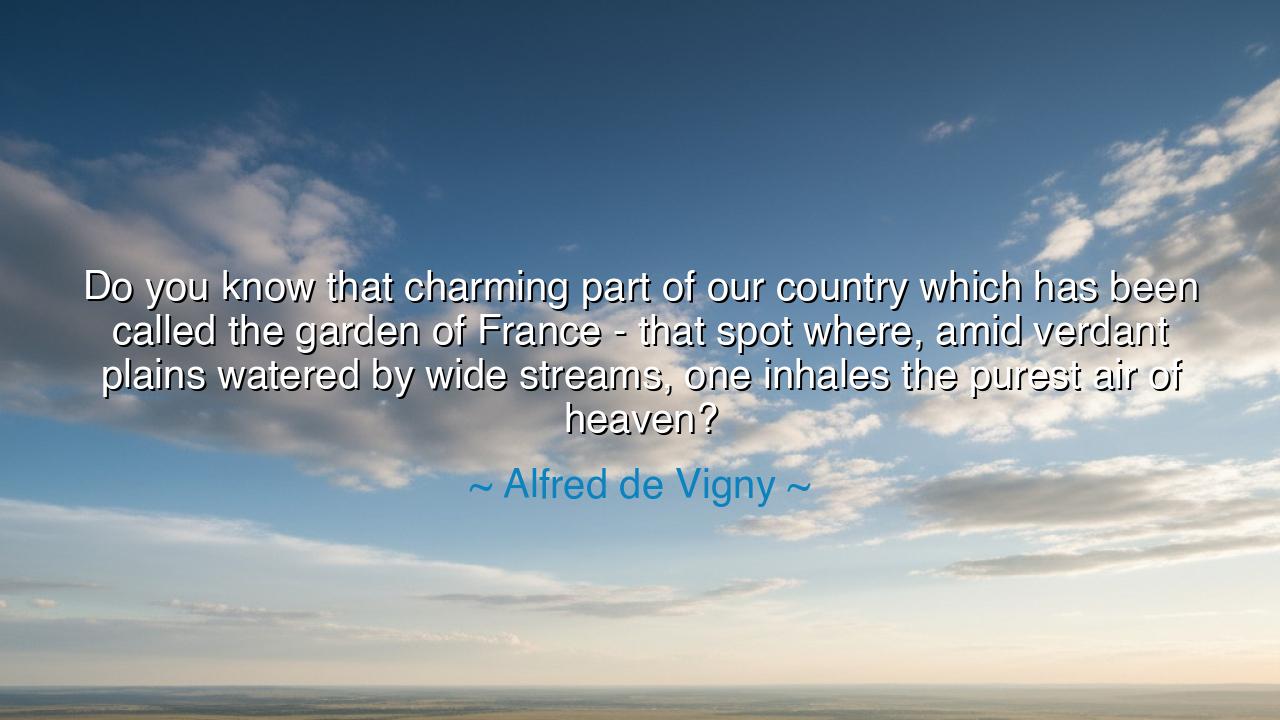
Do you know that charming part of our country which has been
Do you know that charming part of our country which has been called the garden of France - that spot where, amid verdant plains watered by wide streams, one inhales the purest air of heaven?






Hear, then, the words of Alfred de Vigny, poet, philosopher, and soldier of France, who wrote: “Do you know that charming part of our country which has been called the garden of France — that spot where, amid verdant plains watered by wide streams, one inhales the purest air of heaven?” In this single sentence, he evokes not merely a place, but a vision — the union of earth and spirit, of beauty and purity. The garden of France he speaks of is the Loire Valley, a region of flowing rivers, green fields, and castles that seem to float like dreams above the mist. Yet beyond geography, Vigny’s words are an invitation to rediscover what it means to live in harmony with nature — to breathe deeply of the world’s innocence before the noise of modern life had yet begun.
Born in the early 19th century, Alfred de Vigny lived in an age when France, recovering from the storms of revolution and war, longed for stability, grace, and meaning. He was a Romantic — one of those rare souls who could feel the pulse of eternity in a blade of grass. When he wrote of the garden of France, he was not merely praising a land of vineyards and châteaux, but celebrating the ideal of natural serenity, a sanctuary where beauty and virtue dwell together. For Vigny, the purest air of heaven was not only the physical freshness of the countryside — it was the breath of peace that descends upon a soul reconciled with the natural world.
The verdant plains and wide streams of his description are symbols of abundance and purity. They represent a land untouched by corruption, where creation itself seems to breathe in rhythm with humankind. This was, in the eyes of the Romantics, the true paradise — not a faraway heaven, but the living world when seen through the eyes of reverence. To stand in such a place, to inhale that “purest air,” is to remember one’s origin — that man, too, is of the earth, not above it. Vigny’s words teach that to love one’s homeland is not only to honor its soil, but to honor the spirit that dwells in its hills, rivers, and skies.
So it has been throughout history. Consider Jean-Jacques Rousseau, the great philosopher who found solace in the forests and lakes of his native Switzerland. When he grew weary of the pettiness of cities and courts, he turned to nature for truth. “I felt,” he wrote, “as if I were inhaling the soul of the universe.” Rousseau, like Vigny, believed that nature purified the heart — that to breathe her air was to breathe freedom. In this way, the garden of France is not merely a physical land, but a symbol of the soul’s return to innocence — a reminder that peace can only be found where beauty and simplicity reign.
Vigny’s image of the purest air of heaven also speaks to the moral longing of humankind — the desire to live a life unpolluted by envy, greed, and haste. The air of heaven is pure because it is untainted by deceit; it is the air of truth and virtue. Those who dwell too long amid corruption lose the strength of the spirit, just as one who breathes poison loses the strength of the body. But to stand amid verdant plains, where the rivers flow and the light falls gently upon the land, is to remember what it means to live rightly — to dwell in gratitude, humility, and awe.
In this way, Vigny’s garden of France becomes more than a landscape — it becomes a state of being. It is the inner garden that each of us must tend: the part of the soul that still believes in beauty, still longs for purity, still seeks the air of heaven in a world thick with dust. The poet’s vision reminds us that the divine is not distant. It is near — in the green of the fields, the wind that brushes the cheek, the water that glimmers under the sun. To see it, one must only stop, breathe, and remember.
The lesson of this quote, then, is both simple and profound: protect your garden — both the one of the earth and the one of the heart. Seek out the places where the air is clear, where the spirit may rest. When life grows crowded with noise, withdraw for a moment into stillness and breathe the purest air you can find — whether in a forest, a field, or a simple act of peace. For every soul, like every flower, must sometimes be washed by the wind and watered by silence to bloom again.
And so, dear listener, follow the wisdom of Alfred de Vigny: seek the garden of France within your own life — that space of harmony and grace where the heart, like the river, flows freely beneath the open sky. Inhale deeply the air of gratitude, wonder, and truth, for it is, indeed, the purest air of heaven. When you live in such awareness, the whole world becomes your garden, and every breath — a prayer.






AAdministratorAdministrator
Welcome, honored guests. Please leave a comment, we will respond soon